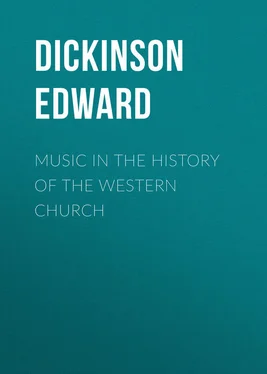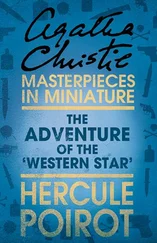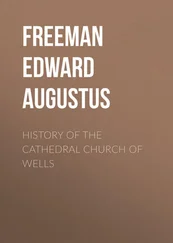Edward Dickinson - Music in the History of the Western Church
Здесь есть возможность читать онлайн «Edward Dickinson - Music in the History of the Western Church» — ознакомительный отрывок электронной книги совершенно бесплатно, а после прочтения отрывка купить полную версию. В некоторых случаях можно слушать аудио, скачать через торрент в формате fb2 и присутствует краткое содержание. Жанр: foreign_antique, foreign_prose, на английском языке. Описание произведения, (предисловие) а так же отзывы посетителей доступны на портале библиотеки ЛибКат.
- Название:Music in the History of the Western Church
- Автор:
- Жанр:
- Год:неизвестен
- ISBN:нет данных
- Рейтинг книги:4 / 5. Голосов: 1
-
Избранное:Добавить в избранное
- Отзывы:
-
Ваша оценка:
- 80
- 1
- 2
- 3
- 4
- 5
Music in the History of the Western Church: краткое содержание, описание и аннотация
Предлагаем к чтению аннотацию, описание, краткое содержание или предисловие (зависит от того, что написал сам автор книги «Music in the History of the Western Church»). Если вы не нашли необходимую информацию о книге — напишите в комментариях, мы постараемся отыскать её.
Music in the History of the Western Church — читать онлайн ознакомительный отрывок
Ниже представлен текст книги, разбитый по страницам. Система сохранения места последней прочитанной страницы, позволяет с удобством читать онлайн бесплатно книгу «Music in the History of the Western Church», без необходимости каждый раз заново искать на чём Вы остановились. Поставьте закладку, и сможете в любой момент перейти на страницу, на которой закончили чтение.
Интервал:
Закладка:
Such, generally speaking, is the most that can definitely be stated regarding the office performed by music in the worship of Israel in the time of its glory. With the rupture of the nation, its gradual political decline, the inroads of idolatry, the exile in Babylon, the conquest by the Romans, the disappearance of poetic and musical inspiration with the substitution of formality and routine in place of the pristine national sincerity and fervor, it would inevitably follow that the great musical traditions would fade away, until at the time of the birth of Christ but little would remain of the elaborate ritual once committed to the guardianship of cohorts of priests and Levites. The sorrowing exiles who hung their harps on the willows of Babylon and refused to sing the songs of Zion in a strange land certainly never forgot the airs consecrated by such sweet and bitter memories; but in the course of centuries they became lost among the strange peoples with whom the scattered Israelites found their home. Many were for a time preserved in the synagogues, which, in the later years of Jewish residence in Palestine, were established in large numbers in all the towns and villages. The service of the synagogue was a liturgical service, consisting of benedictions, chanting of psalms and other Scripture passages, with responses by the people, lessons from the law and the prophets, and sermons. The instrumental music of the temple and the first synagogues eventually disappeared, and the greater part, if not the whole, of the ancient psalm melodies vanished also with the dispersion of the Levites, who were their especial curators. Many details of ancient ritual and custom must have survived in spite of vicissitude, but the final catastrophe, which drove a desolate, heart-broken remnant of the children of Judah into alien lands, must inevitably have destroyed all but the merest fragment of the fair residue of national art by sweeping away all the conditions by which a national art can live.
Does anything remain of the rich musical service which for fifteen hundred years went up daily from tabernacle and temple to the throne of the God of Israel? A question often asked, but without a positive answer. Perhaps a few notes of an ancient melody, or a horn signal identical with one blown in the camp or in the temple court, may survive in the synagogue to-day, a splinter from a mighty edifice which has been submerged by the tide of centuries. As would be presumed of a people so tenacious of time-honored usages, the voice of tradition declares that the intonations of the ritual chant used in the synagogue are survivals of forms employed in the temple at Jerusalem. These intonations are certainly Oriental in character and very ancient, but that they date back to the time of David cannot be proved or disproved. A style of singing like the well-known “cantillation” might easily be preserved, a complete melody possibly, but the presumption is against an antiquity so great as the Jews, with pardonable pride, claim for some of their weird, archaic strains.
With the possible exception of scanty fragments, nothing remains of the songs so much loved by this devoted people in their early home. We may speculate upon the imagined beauty of that music; it is natural to do so. Omne ignotum pro magnifico . We know that it often shook the hearts of those that heard it; but our knowledge of the comparative rudeness of all Oriental music, ancient and modern, teaches us that its effect was essentially that of simple unison successions of tones wedded to poetry of singular exaltation and vehemence, and associated with liturgical actions calculated to impress the beholder with an overpowering sense of awe. The interest which all must feel in the religious music of the Hebrews is not due to its importance in the history of art, but to its place in the history of culture. Certainly the art of music was never more highly honored, its efficacy as an agent in arousing the heart to the most ardent spiritual experiences was never more convincingly demonstrated, than when the seers and psalmists of Israel found in it an indispensable auxiliary of those appeals, confessions, praises, and pious raptures in which the whole after-world has seen the highest attainment of language under the impulse of religious ecstasy. Taking “the harp the monarch minstrel swept” as a symbol of Hebrew devotional song at large, Byron’s words are true:
“It softened men of iron mould,
It gave them virtues not their own;
No ear so dull, no soul so cold,
That felt not, fired not to the tone,
Till David’s lyre grew mightier than his throne.”
This music foreshadowed the completer expression of Christian art of which it became the type. Inspired by the grandest of traditions, provided with credentials as, on equal terms with poetry, valid in the expression of man’s consciousness of his needs and his infinite privilege, – thus consecrated for its future mission, the soul of music passed from Hebrew priests to apostles and Christian fathers, and so on to the saints and hierarchs, who laid the foundation of the sublime structure of the worship music of a later day.
CHAPTER II
RITUAL AND SONG IN THE EARLY CHRISTIAN CHURCHA.D. 50-600
The epoch of the apostles and their immediate successors is that around which the most vigorous controversies have been waged ever since modern criticism recognized the supreme importance of that epoch in the history of doctrine and ecclesiastical government. Hardly a form of belief or polity but has sought to obtain its sanction from the teaching and usages of those churches that received their systems most directly from the personal disciples of the Founder. A curiosity less productive of contention, but hardly less persistent, attaches to the forms and methods of worship practised by the Christian congregations. The rise of liturgies, rites, and ceremonies, the origin and use of hymns, the foundation of the liturgical chant, the degree of participation enjoyed by the laity in the offices of praise and prayer, – these and many other closely related subjects of inquiry possess far more than an antiquarian interest; they are bound up with the history of that remarkable transition from the homogenous, more democratic system of the apostolic age, to the hierarchical organization which became matured and consolidated under the Western popes and Eastern patriarchs. Associated with this administrative development and related in its causes, an elaborate system of rites and ceremonies arose, partly an evolution from within, partly an inheritance of ancient habits and predispositions, which at last became formulated into unvarying types of devotional expression. Music participated in this ritualistic movement; it rapidly became liturgical and clerical, the laity ceased to share in the worship of song and resigned this office to a chorus drawn from the minor clergy, and a highly organized body of chants, applied to every moment of the service, became almost the entire substance of worship music, and remained so for a thousand years.
In the very nature of the case a new energy must enter the art of music when enlisted in the ministry of the religion of Christ. A new motive, a new spirit, unknown to Greek or Roman or even to Hebrew, had taken possession of the religious consciousness. To the adoration of the same Supreme Power, before whom the Jew bowed in awe-stricken reverence, was added the recognition of a gift which the Jew still dimly hoped for; and this gift brought with it an assurance, and hence a felicity, which were never granted to the religionist of the old dispensation.
The Christian felt himself the chosen joint-heir of a risen and ascended Lord, who by his death and resurrection had brought life and immortality to light. The devotion to a personal, ever-living Saviour transcended and often supplanted all other loyalty whatsoever, – to country, parents, husband, wife, or child. This religion was, therefore, emphatically one of joy, – a joy so absorbing, so completely satisfying, so founded on the loftiest hopes that the human mind is able to entertain, that even the ecstatic worship of Apollo or Dionysus seems melancholy and hopeless in comparison. Yet it was not a joy that was prone to expend itself in noisy demonstrations. It was mingled with such a profound sense of personal unworthiness and the most solemn responsibilities, tempered with sentiments of awe and wonder in the presence of unfathomable mysteries, that the manifestations of it must be subdued to moderation, expressed in forms that could appropriately typify spiritual and eternal relationships. And so, as sculpture was the art which most adequately embodied the humanistic conceptions of Greek theology, poetry and music became the arts in which Christianity found a vehicle of expression most suited to her genius. These two arts, therefore, when acted upon by ideas so sublime and penetrating as those of the Gospel, must at last become transformed, and exhibit signs of a renewed and aspiring activity. The very essence of the divine revelation in Jesus Christ must strike a more thrilling note than tone and emotional speech had ever sounded before. The genius of Christianity, opening up new soul depths, and quickening, as no other religion could, the higher possibilities of holiness in man, was especially adapted to evoke larger manifestations of musical invention. The religion of Jesus revealed God in the universality of his fatherhood, and his omnipresence in nature and in the human conscience. God must be worshipped in spirit and in truth, as one who draws men into communion with him by his immediate action upon the heart. This religion made an appeal that could only be met by the purification of the heart, and by reconciliation and union with God through the merits of the crucified Son. The believer felt the possibility of direct and loving communion with the Infinite Power as the stirring of the very bases of his being. This new consciousness must declare itself in forms of expression hardly glimpsed by antiquity, and literature and art undergo re-birth. Music particularly, the art which seems peculiarly capable of reflecting the most urgent longings of the spirit, felt the animating force of Christianity as the power which was to emancipate it from its ancient thraldom and lead it forth into a boundless sphere of action.
Читать дальшеИнтервал:
Закладка:
Похожие книги на «Music in the History of the Western Church»
Представляем Вашему вниманию похожие книги на «Music in the History of the Western Church» списком для выбора. Мы отобрали схожую по названию и смыслу литературу в надежде предоставить читателям больше вариантов отыскать новые, интересные, ещё непрочитанные произведения.
Обсуждение, отзывы о книге «Music in the History of the Western Church» и просто собственные мнения читателей. Оставьте ваши комментарии, напишите, что Вы думаете о произведении, его смысле или главных героях. Укажите что конкретно понравилось, а что нет, и почему Вы так считаете.












